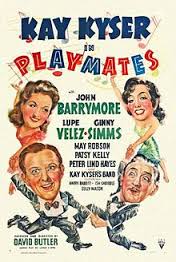
PLAYMATES
US, 1941, 96 minutes, Black and white.
Kay Kyser, John Barrymore, Lupe Velez, Jinnie Sims, May Robeson, Patsy Kelly, Peter Lind Hayes.
Directed by David Butler.
This is film which contemporary audiences will not much appreciate, even thinking it rather silly (which it is). It is a film for cinema historians and film buffs. This is principally because it is the last film of the celebrated stage and screen actor, John Barrymore, from the famous Barrymore family, sister Ethel, brother Lionel, daughter Diana, granddaughter Drew.
The film has a basically stupid idea – that John Barrymore should coach bandleader Kay Kyser as a Shakespearean actor. The motivation of the publicists of each of the stars is that they will get their names in the papers, no matter what, and Barrymore will get a radio advertising contract and Kyser a broad audience. The basic story came from James V. Kern, writer of a number of films of the 1950s but more prolific as a television director.
Kay Kyser was popular in the 1940s as a bandleader and appeared in a number of films. As he appears in this film, he is a genial enough personality, more at home directing his band, though he has a number of comic moments here.
John Barrymore had had a celebrated career but declined into parody of himself, having his famous profile and expressions, especially eyes rolling and raised eyebrows, which are very evident in this film. He also had severe alcohol problem and died after this film from cirrhosis of the liver. To that extent, the oddball plot resembles something of his own personal career. He died at the age of 60. So, this is an opportunity to see Barrymore and, despite the constant mugging, to hear him recite some passages of Shakespeare, especially Hamlet’s To Be or Not To Be soliloquy.
The film offers opportunities for contemporary songs, especially from Jinnnie Simms, very popular during the 1940s, also appearing in some films.
In the supporting cast are Patsy Kelly as Barrymore’s gung-ho assistant and Peter Lind Hayes as Kyser’s enthusiastic manager. There is a pleasing support performance by veteran May Robson, in her 80s at this time, as Kyser’s grandmother, all bark but with little bite and charmed by Barrymore. As well, there is a lively performance, and rumba, from Lupe Velez.
Director David Butler had been working in film since the 1920s, many routine films in the 1930s and into the 1940s but success at Warner Brothers in the late 1940s, early 50s, including six Doris Day musicals and Lullaby of Broadway, Tea for Two, calamity Jane.
So this is what RKO was doing at the beginning of the 1940s – and sad postscript to the life and career of John Barrymore.